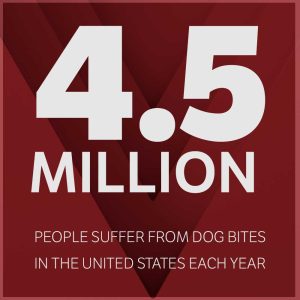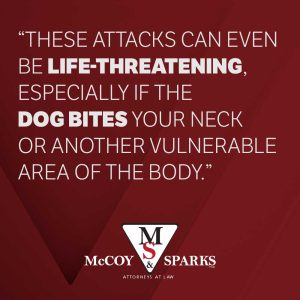

Although there’s much to love about dogs, these animals can be incredibly dangerous if they feel threatened or become territorial. Every year, over 4.5 million people suffer from dog bites in the United States alone, and one out of five of those victims needs medical attention.
If you suffer from a serious dog bite, you could face costly medical bills, and the injury may temporarily or permanently impact your ability to work and enjoy life. Further, these injuries can leave you with crippling post-traumatic stress disorder, anxiety, fear, and depression.
Because you may sustain financial losses and pain and suffering as a direct result of your dog bite accident, it’s important to file a claim against the dog owner to recover compensation.
Here’s what you need to do after a dog attack to ensure your safety and recover damages.
What To Do When a Dog Bites Me
If you’ve suffered from a dog bite, you need to seek medical attention. Often, these bites can cause serious tissue damage, blood loss, and perhaps even broken bones. These attacks can even be life-threatening, especially if the dog bites your neck or another vulnerable area of the body.

It’s critical that you contact 911 immediately if you’ve suffered serious injuries. Make sure to follow their instructions and don’t refuse if they want to take you to the hospital.
If the dog bite requires emergency medical attention, you or someone else should also contact the police. They will create a dog bite incident report that you can use as evidence for your claim.
If your injuries don’t require emergency medical treatment, you should still see a medical professional as soon as possible. You can treat the wound in the meantime by cleaning it, applying antibiotic cream, and bandaging the injury. Additionally, you can apply pressure to reduce bleeding and elevate the injured area.
Regardless of whether you’re able to treat the wound, you should still seek immediate medical attention. The treating physician will disinfect and bandage your injury, and they may prescribe antibiotics to prevent infection. The medical professional may also suggest that you receive a rabies vaccine if you’re not sure whether the dog was infected.
When receiving medical attention, it’s critical that you keep records of all of your medical bills and records, as this evidence will show that you suffered damages as a direct result of the dog bite attack.
How Do I Gather Evidence Proving That a Dog Bit Me?
In Kentucky, you don’t need to prove that a dog owner was negligent to recover compensation after an attack. All you need to demonstrate is that the person you’re filing against is the dog’s owner, the dog bit you, and that you suffered damages as a direct result.
It’s critical to note that you need to supply as much evidence as possible proving your dog bite injury claim. Some useful forms of evidence you can use include:
- Medical Records: Detailed medical records documenting the extent of the injury, the treatment you received, and future prognosis are incredibly useful in proving that you suffered physical damage as a direct result of the dog attack. This may include diagnostic imaging, surgical reports, doctors’ notes, prescriptions, and any other relevant medical documentation. These records can also provide evidence that the injury will impact your ability to work and enjoy life.
- Witness Statements: Statements from individuals who witnessed the dog bite incident can provide important firsthand accounts of what transpired. Witnesses may include neighbors, family members, and anyone else who saw the incident or its aftermath.
- Photos and Videos: Photos and videos of the dog, the location of the incident, your injuries, and the progression of your healing process can serve as incredibly useful evidence.
- The Dog’s History: You can supply evidence that the dog has a history of aggression or dangerous behavior. Formal complaints against the dog or prior incidents can provide supporting proof that the dog bit you.
- Incident Reports: If the police recorded an incident report at the scene or if you reported the accident later, you can use a copy of the report to help establish the details surrounding the attack.
- Proof of Financial Losses: You should have a detailed record of how the attack impacted you financially, including medical bills, receipts for related expenses, and evidence that you lost wages.
- Psychological or Emotional Impact: If the dog bite caused you emotional distress or psychological harm, evidence from mental health professionals may be necessary to establish the extent of your emotional pain and suffering.
Comparative Negligence in Kentucky Dog Bite Accidents
The reason you need to provide an abundance of evidence is that the dog owner or their insurance company may claim that you’re partially or wholly responsible for the incident.
Kentucky follows the pure comparative negligence rule, which means that even if you were partially at fault for the accident, you can still recover compensation from the dog owner, but your percentage of liability will directly affect your compensation.
If the dog owner’s insurance company claims you’re 50% responsible for the accident because you provoked the dog in some way, that will reduce the total amount of compensation you can recover for medical bills and other damages by 50%.
You may not have contributed to the accident in any way, but the dog owner’s insurance company may still try to assign liability to avoid paying you the full damages you deserve.
Is There a Dog Bite Lawyer Near Me?
If you or a loved one were bitten by a dog, you need to contact a dog bite personal injury attorney as soon as possible, as they can help you prove your claim and recover damages.
For experienced dog bite injury lawyers in Kentucky, contact McCoy & Sparks Attorneys at Law. We’ll work diligently to get you the full compensation that you deserve.
You can schedule a free case consultation with us today by calling 844-459-9467, or you can schedule your appointment online.

